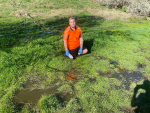The Government amended the Resource Management (Consenting and Other System Changes) Amendment Bill to broaden what water discharges can be allowed as a permitted activity.
This follows Waikato Regional Council informing the Government that unless urgent changes were made to water discharge rules in the RMA, approximately 2800 Waikato farms would require resource consents for on-farm activities.
RMA Reform Minister Chris Bishop says these consents would be fore routine on-farm activities that farmers have already been doing, often for years, without requiring a consent.
"The Waikato region generates 20% of the nation's primary exports, with dairy farming supporting the employment of over 9000 Kiwis in the Waikato alone. If we don't act, the economic heart of New Zealand's primary sector cold grind to a halt under what would effectively be a 'stop work' order.
"Waikato Regional Council wasn't the only council to raise concerns. Horizons Regional Council, Bay of Plenty Regional Council, Tasman District Council and Environment Southland all requested further changes to water discharge rules as well."
Federated Farmers RMA reform spokesperson Mark Hooper says the RMA changes are practical and pragmatic "but it's actually just common sense".
Read More:
- Farmers back Government pause on RMA plan changes
- Government halts RMA planning work in major win for farmers
- Dairy farmers to benefit from major RMA reforms planned by government
"Without these urgent changes to the discharge rules under section 70of the RMA, we would have been facing a ridiculous, expensive and totally unworkable situation.
"Thousands of farmers would have needed to go through the process of applying for a new resource consent, and ticking boxes, for absolutely no environmental gain. A flood of consent applications would have landed with local councils all at once, creating a bureaucratic backlog and stalling the engine room of the economy at the same time."
Hooper says councils will still be able to require consent for genuinely high-risk activities but won't be forced to do so when something such as a farm plan is a better option.


















